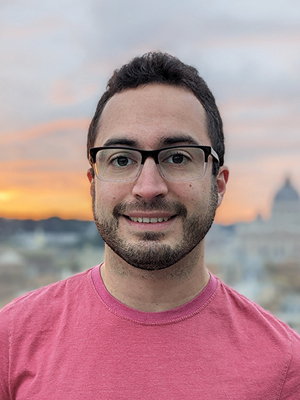Member Spotlight: Meet Emerson Nolasco
Member Spotlight is a regular INFORM magazine column that features members who play critical roles in AOCS.
 AOCS Divisions are forums for sharing technical information while offering networking and mentorship for early career professionals. The Edible Applications Technology Division comprises specialists in the processing and utilization of lipids industry whose primary focus is on food applications.
AOCS Divisions are forums for sharing technical information while offering networking and mentorship for early career professionals. The Edible Applications Technology Division comprises specialists in the processing and utilization of lipids industry whose primary focus is on food applications.
This issue of INFORM presents an interview with Emerson Nolasco, a graduate student member of the Health and Nutrition division. Nolasco has been a member of AOCS for three years and has participated in the poster pitch competition, winning second place in two consecutive years (2022 and 2023) in this Division, along with the People’s Choice Award in 2023.
Moreover, Emerson has participated in the Protein and Co-Products Division poster pitch competition, winning second place as well as the People’s Choice Award in 2023.
What are your areas of research as a graduate student, and what led you to your interest in health and nutrition?
I’m currently working with functional foods, which is a food that gives you a health benefit beyond nutrition. Specifically, I work with egg white hydrolysate and how it can impact different mechanisms of hypertension, delaying its progression as a preventive approach.
For my undergrad, I mainly focused on food chemistry and food safety, but coming to the University of Nebraska-Lincoln expanded my knowledge on how food can have a positive impact on our body. Food compounds play a role in how our cells and gut microbiome respond to stress and inflammation, which I find fascinating.
How did you become acquainted with AOCS? How have you participated in the community?
I became acquainted with AOCS thanks to my advisor Kaustav Majumder and my lab mates. As a lab, we started participating in AOCS around 2018-2019, and I later participated for the first time in the virtual conference in 2020. Afterward, I participated in the Health and Nutrition and the Protein and Co-Products Division as a poster presenter. I also participated in both Division’s sessions to brainstorm what topics could be featured in future meetings.
I realized there are more things in common than we think between Divisions, and we can work together to enhance the science quality and relevance in our research areas.
AOCS is a great way to network with peers in academia and research-based industry, the latter is something I would like to pursue after graduation. So, I will take advantage of the mentoring, networking, and the introduction to career opportunities AOCS offers.
How does AOCS currently support your professional goals?
In my three years of being a member and participant in the annual meetings, AOCS has been a great platform to showcase my research and skills as well as an excellent platform for networking with peers in academia and the industry.
This is important for early career researchers as we can make connections that will be beneficial in our careers after graduation.
How does the Health and Nutrition Division align with your interests and research area? Have you made any connections that have helped you in your field?
The Health and Nutrition Division is great for our research area as it aligns with how food-derived compounds such as carotenoids, omega-3 fatty acids, peptides, or digestion-resistant proteins can impact the health of consumers. It is hard to believe but there was not a conference specifically for proteins since it is a wide topic. AOCS has fostered research scientists in this area in a great way and now even more with the Sustainable Protein Forum.
I have made valuable connections with the judges from my poster presentations, my advisor’s previous lab members, and fellow graduate students. I’m sure we will help each other down the road.
What is the greatest benefit that you have derived from your involvement in AOCS and the Health and Nutrition Division?
I would recommend engaging and participating in any opportunity AOCS or any other association has to offer. By engaging we network, build our community, exchange ideas that we would otherwise not consider, and develop soft skills which are very valuable in any environment where we perform.
What is your ideal next step after you graduate?
I would like to take the skills I have learned in the Food BioPep Lab at the University of Nebraska-Lincoln and apply them in the industry. In the last five years, there have been companies that are applying concepts such as precision fermentation and molecular biology to produce food that is more sustainable and nutritious.
I will take my experience and insights from the Health and Nutrition Division and help make food even healthier to maximize the benefits for consumers.

